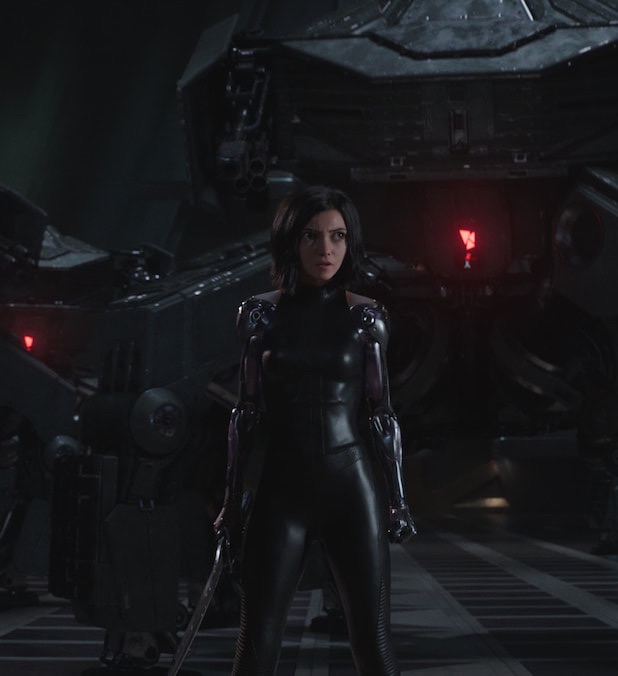Review:
"Alita: Battle Angel"

Release Date: Feb. 14, 2019
Rating: PG-13 Running Time: 122 minutes Alita: Battle Angel is Robert Rodriguez’s Poltergeist. Yes, Tobe Hooper was the director of record for Poltergeist but it felt more like it was shaped, formed and molded by its producer and co-screenwriter, Steven Spielberg. And everything that we have come to learn about the making of Poltergeist indicates—fairly or unfairly—that it was Spielberg who called all the creative shots. Would it surprise anyone if, in years to come, we find out that Alita: Battle Angel executive producer and co-writer James Cameron kept his director of choice on an equally short leash? Cameron spent years trying to direct this adaptation of the Japanese manga series Battle Angel Alita by Yukito Kishiro. Set in 2563 in the post-apocalyptic Iron City, the Austin-shot Alita tells the story of a damaged female cyborg (Rosa Salazar) whose severed head is found and rescued from a scrapheap by scientist Dr. Dyson Ido (played with inherent fatherly warmth and concern by an understated Christoph Waltz). Outfitted with a temporary body, Alita struggles to recover her memories and the mission that left her disembodied. But Alita is no ordinary cyborg: she is a technological wonder of a warrior blessed with a human brain. She is a remnant of “The Fall,” a war that left Earth divided between the haves and the have nots. The poor reside in Iron City; the affluent live in the sky city of Zalem. When his multiple Avatar sequels became a priority, Cameron entrusted Rodriguez to realize the Terminator and Titanic director’s vision. Rodriguez does such a good job of making a James Cameron-esque sci-fi epic that there is barely any hint of Rodriguez in this gender-reversed Terminator-Pinocchio crossover. Gone are Rodriguez’s low-budget shortcuts. He’s working with a Cameron-sized budget that’s somewhere between $150 million and $200 million. And every penny is on the screen. Gone are Rodriguez’s grindhouse sensibilities, especially during the clean and meticulously executed action sequences that informs Alita’s third and final act. And gone is Rodriguez’s verve and energy, replaced with a sure and steady hand. Bearing all this in mind, it is hard to tell whether Alita represents the maturing of Rodriguez as a filmmaker or an anomaly on a resume that is filled with films known for their colorful and gleefully controlled mayhem. While Alita is striking for being Rodriguez’s only anonymous offering to date, it quickly emerges as his most technically proficient. The melding of practical and computer-generated is impressive, the editing is smooth and engaging, the sprawling sets evoke a true sense of place, and the deliberate pacing is designed to gradually build to a fast-paced third act. Visually, Alita is as breathtaking to behold Avatar. This is an urban jungle as looks and feels as tangible and as alluring as the forests of Pandora. Plus, Alita offers the best use of 3D since Hugo. Perhaps this is Rodriguez stepping up his game to meet the demands of his boss. Perhaps this is Cameron and Cameron’s longtime producer, Jon Landau, making themselves available to assist Rodriguez to the fullest. Perhaps this is Cameron and Landau exerting as much influence as possible to ensure Alita is the film Cameron wanted to but could not direct. At the heart of Alita is the so-called Battle Angel. While it takes some time to get accustomed to her exaggerated cat eyes, Alita quickly presents herself as a convincing living and breathing anime character by Rosa Salazar through deeply expressive facial performance capture. Salazar brings to Alita the child-like wonder of a young woman who instantly falls in love with a world that is new and familiar. Alita takes its time drawing out the warrior in its unsuspecting subject, even if her instincts and skills are always present and available to her when necessary. Salazar gradually fills Alita with the strength and confident to fulfil her potential as a protector of the weak and scared. But Salazar never forgets to keep Alita more human than human. The problem with Alita is that it does not have a story to tell. The focus is Alita’s physical and emotional growth and the battle she wages to recover her memory. Most of the time, Alita fancies itself as a coming-of-age allegory. Rodriguez mostly handles Alita’s transition to “womanhood” with grace and respect but there are moments when little is shown in the way tact, such as when the adult Alita is physically revealed for the first time. Boiled to its essence, though, Cameron’s script—co-written with Laeta Kalogridis—is an attempt to reverse engineer The Terminator and replicate Titanic’s romance, the latter of which is essential to Alita’s personal journey but often threatens to overwhelm the rest of the proceedings. Alita is often sidetracked in her quest to regain her memory by cyborg bounty hunters out to capture or kill Iron City’s most wanted or by the game of Motorball, which is essentially Rollerball but played by cyborgs. The only way to ascend to Zalem is to win Motorball, resulting in several wild games which allow Rodriguez to get loosen up and have some fun with the technology at his disposal. But the Motorball bouts only reinforce the notion that Alita is a nothing more than a series of encounters and experiences designed to resolve a young woman’s existential crisis. Alita’s mission does not become clear until the last 20 minutes, which is too late for Rodriguez to stage a satisfying resolution. Instead, we are left with a letdown of a cliffhanger and a failed attempt by Cameron to turns Titanic’s ending on its head. There also is a big reveal at the end of Alita, clearly designed as a driving force of a potential sequel, but it is handled in such a clumsy and ineffective manner that it doesn’t leave you invested in the future of both our heroine and any planned franchise. Cameron should have learned from Avatar that, when it comes to original or low-profile IPs, is it best to deliver a self-contained adventure that can be expended upon if demand is there. Alita falls into the trap of trying to launch a franchise without first knowing whether there is an audience to warrant stretching a story over the course of two or three films. It speaks to the arrogance that presumes we want not one, not two, not three but four Avatar sequels. Luckily for Rodriguez, he won’t suffer the blame if Alita fails. He’s completed the task handed to him, and he’s done it as well as expected for as Cameron’s stand-in. It’s all on Cameron because Alita is his cyberbaby and its shortcomings are his alone. Robert Sims Aired: Feb. 14, 2019 Web site: https://www.foxmovies.com/movies/alita-battle-angel |
|
